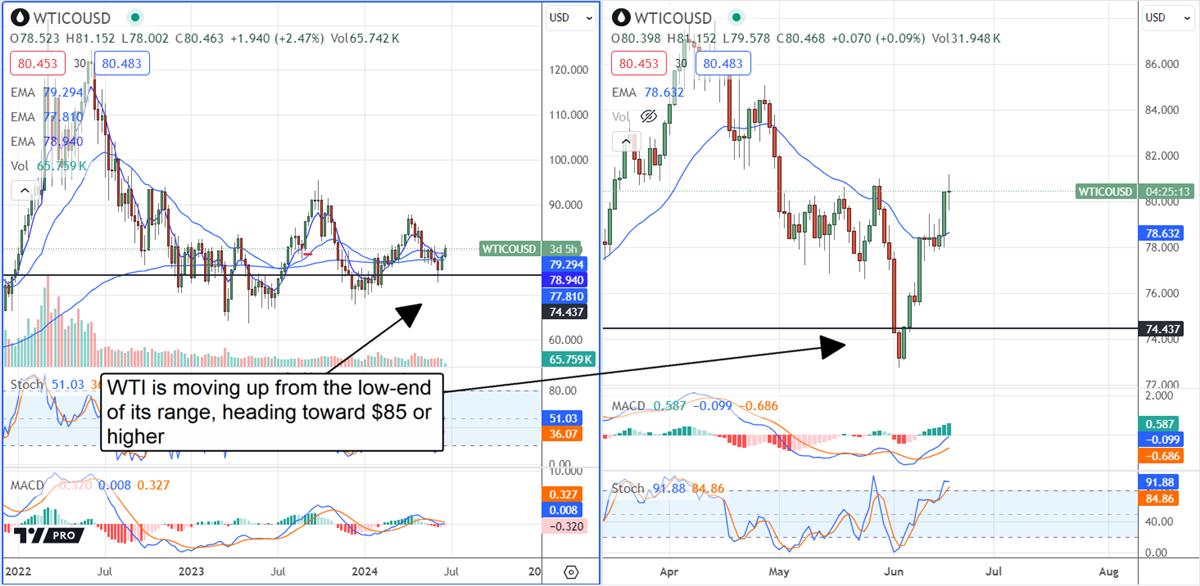
Oil prices (NYSEARCA: USO) are near the low end of a multi-year trading range, aiding the broad market rally in stocks. Oil prices are a fundamental driver of inflation that compounds within the economy, and the inflation outlook is driving the market. Lower oil prices undercut inflation.
The latest CPI data failed to spur the FOMC into action but aligns with the idea a shift is underway, and the next policy move will be to cut rates. Lower oil prices support that outlook, but there is also risk. In this environment, the economy is under pressure from high interest rates but biding its time; when the first interest rate cut comes, global economic activity will begin to improve, drive oil demand, lift the oil price, and drive inflation. That means the Fed will unlikely cut rates soon; higher for longer is getting longer and longer.
OPEC+ Ends Voluntary Production Cuts, So What?
OPEC+'s decision to end production curbs and increase supply was among the causes of the latest corrections in oil prices. However, the details of the decision belie the bearish implications for oil prices, and the original statement was walked back and hedged in favor of higher, not lower, oil prices.
Today, OPEC+ curbs production by 5.86 million barrels per day (bpd), or about 5.7% of global supply. Of that, 3.66 million daily barrels are official cuts, and 2.2 million are voluntary cuts. While the voluntary cuts are slated to end at the end of September, that is three months later than originally planned, and the curb won’t simply vanish.
The cartel plans to slowly phase the 2.2 million barrels back into the market over a year, which will have little impact on the supply/demand imbalance. Demand is expected to grow with or without the FOMC cutting rates; it is no coincidence the cartel is timing an end to curbs to coincide with Fed rate cuts; investors should expect OPEC to alter its plans as the outlook for interest rates and inflation change. Coincidentally, OPEC walked back on its initial statement and said it could delay the increase in production if conditions warranted.
The Fed's Decision is Tied to Oil Demand: It’s a No-Win Situation
The Fed’s decision to cut rates is as tied to the oil price as anything else. There is a clear correction with the rise in oil prices and the pace of inflation that will keep the committee from acting too soon. Cutting rates too soon will reinvigorate oil demand, create a bull market for oil, and lead inflation to new heights. The takeaway is that the FOMC can’t cut rates for fear of sparking a rally in oil. The only way it can control the oil price is to cause a recession with high rates. The committee is walking a razor's edge with rampant inflation on one side and recession on the other.
Demand is another factor lulling the market to sleep. The IEA forecasts a sharp slowdown in demand beginning in 2023 that will lead to massive oversupply. That's bearish news. However, their forecast is based on anticipated technological advancements tied to electrification and renewable energy that may or may not happen. The mitigating factor is that demand growth may stall, but it won't disappear. We need oil for more than cars. With a finite oil supply (estimates have the supply at less than 50 years at current usage), there is nowhere for the price to go but up over time.
Oil Price Moves Higher: Buffett Ups His Stake in Occidental Petroleum
And where is the oil price going now? The oil price is bobbing near its floor now and heading higher on recent data. An improving outlook for summer demand, OPEC’s assurance that it would keep supply tight if needed, and a reduction in the production growth forecast support the market. The price of WTI is heading back to the top of its range, which will likely keep inflation running hot.
What are investors to do with this information? Invest in energy companies like Warren Buffet and Berkshire Hathaway (NYSE: BRK.A) are doing. The energy industry is contracting today due to the deleveraging of oil prices since 2022 but is still making profits. At $80, the oil price is trending above the 3-year, 5-year, and 10-year averages, putting the margin in the high-end range, generating solid cash flow, and allowing oil giants to invest in growth, efficiency, and shareholder value.
Mr. Buffett chose Occidental Petroleum (NYSE: OXY), which is paying down debt and buying back preferred shares to improve leverage ratios and shareholder equity. The latest news is a series of buys in June, the first in six months, bringing the stake to roughly 30%.

